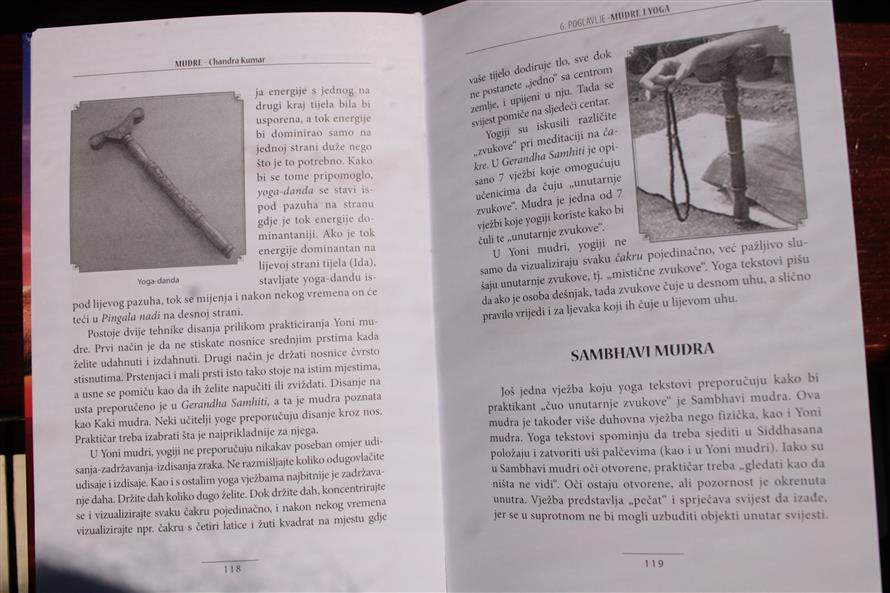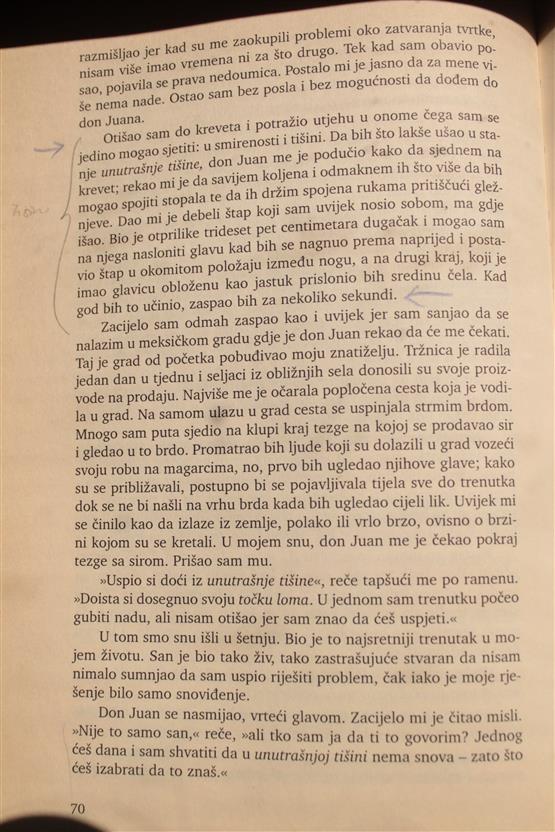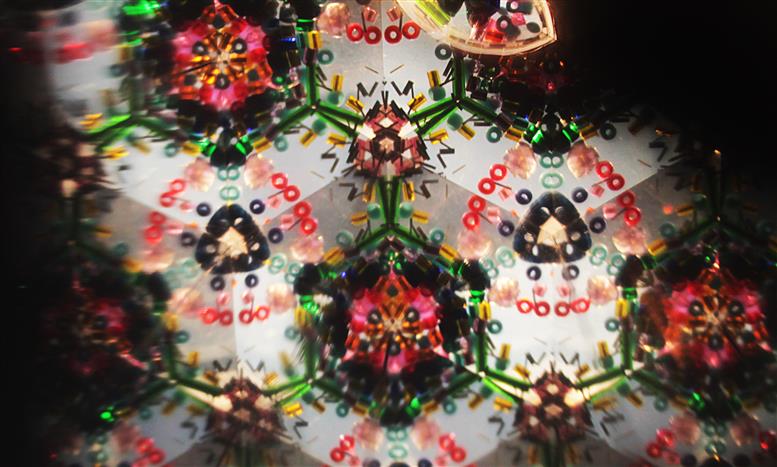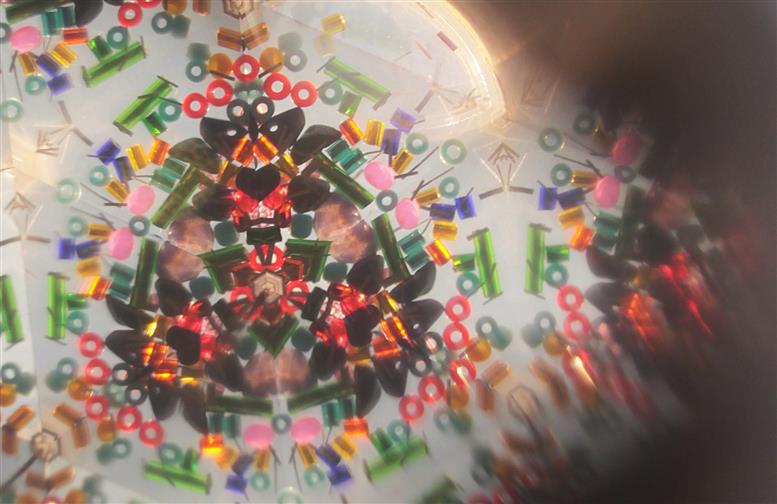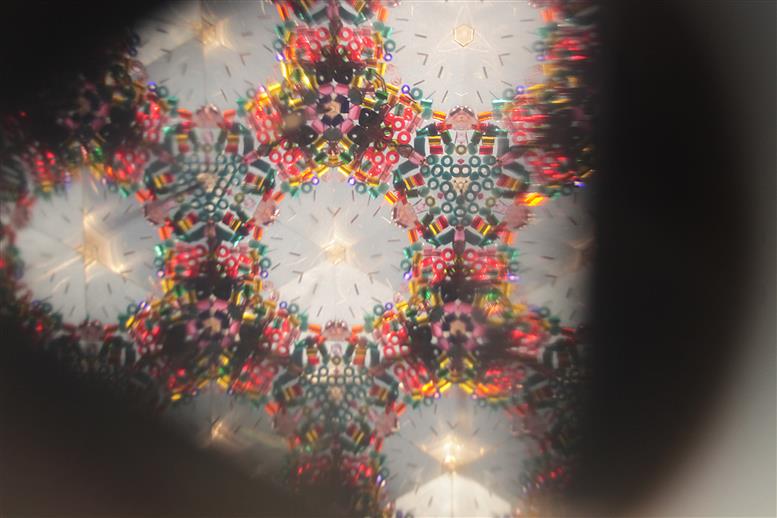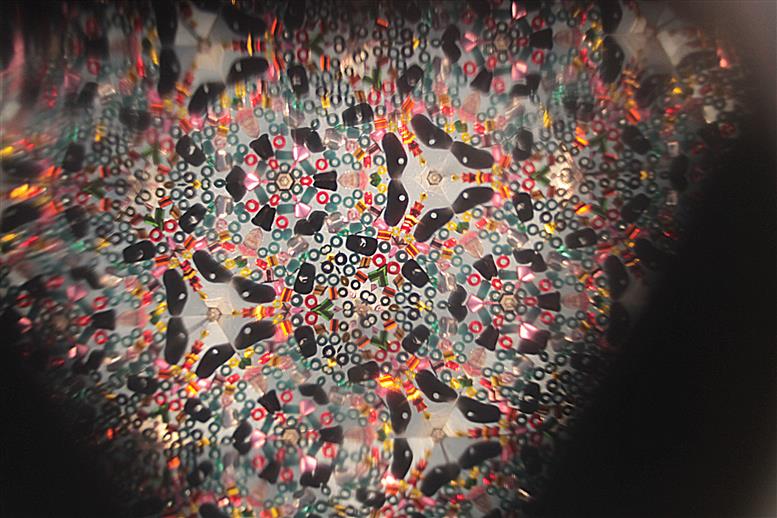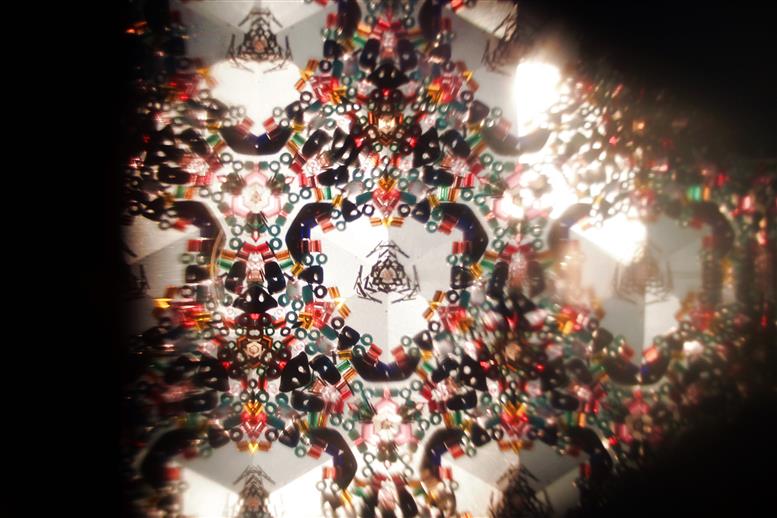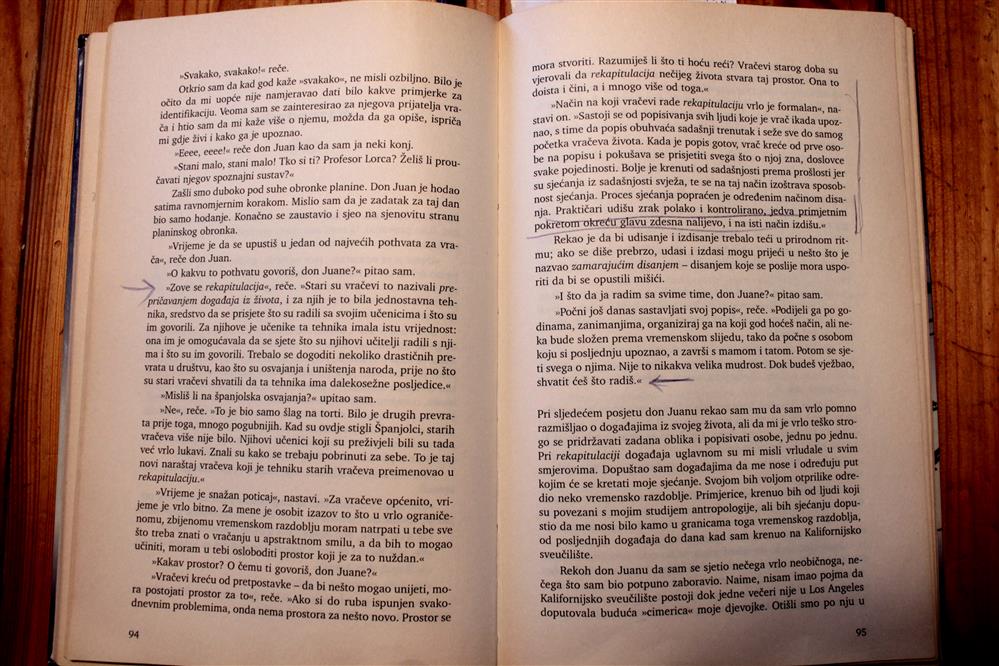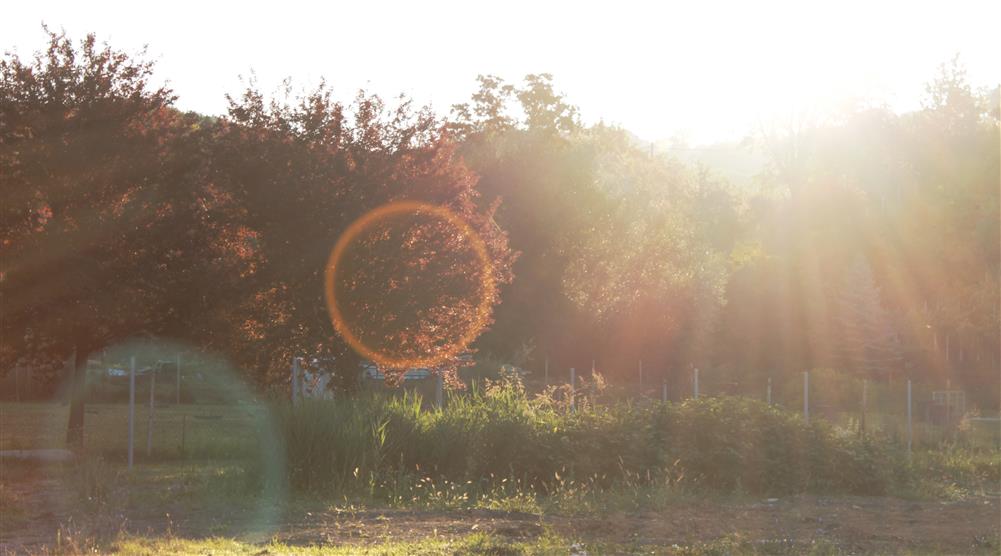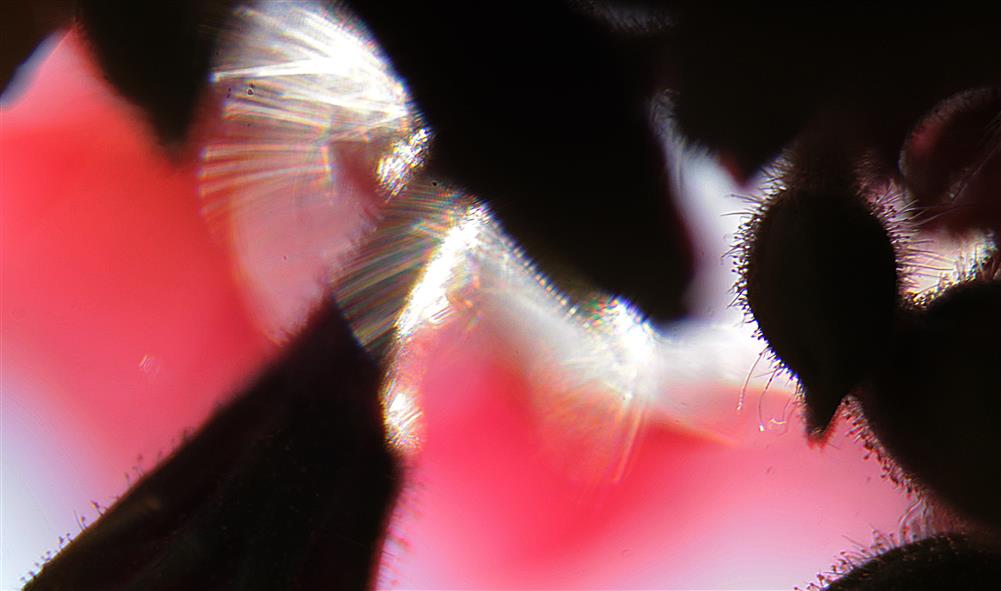utorak, 28.07.2015.
Video mog vrta
|
Danas sam željela završiti video vrta, jer sutra gibam na par dana. Htjela sam to skinuti sa dnevnog reda....da mogu krenuti s nečim novim. Na žalost, ima svakakvih greškica, glavna zamjerka je da su snimke nekako hektične, prebrze, kadrovi se ponavljaju, neki spojevi klipova su mi se pomaknuli, pomaknuli se......... Ipak, sada imam ideje kako bi trebalo, pa nadam se nečem suvislijem idući puta. Sa manje vrta hahahahahahaaaaaaa...... :)))))) Vidjet ćete, između ostalog, sestrinu mačku, klepetalicu od školjaka, mene u suprugovoj pidžami, prelijevajući škaf (multitasking: zalijevam dok snimam), susjedne kuće i našu također (nije bogznašto :-P)...kako bilo , evo ga: (i da, dugačak je, traje preko 6 min!!!!!) Svima baj baj do nekog idućeg puta :)))))) |
ponedjeljak, 27.07.2015.
|
...
U određenom času mojeg naukovanja, don Juan mi je izložio složenu životnu situaciju u kojoj se nalazio. Tvrdio je, s čime sam se teško mogao složiti, da živi u kolibi u Sonori samo zato što koliba odgovara stanju moje svijesti. ... C.Castaneda, Aktivna strana beskonačnosti ...The wounds she gave me Were the wounds that would heal me... I was brought to my senses ,Sting |
subota, 25.07.2015.
prošlonoćna
|
Edit1:
Činjenica da nešto ne opažamo u svijetu oko sebe ne znači da to nešto i ne postoji (moguće da nam tijelo nije opremljeno fiziologijom koja omogućava taj opažaj, ili tijelo nije istrenirano da to opazi, ili je tijelu zabranjeno da to opazi). Edit2: Ova slika je minimalno obrađena, dodano je samo malo kontrasta za istaknuti detalje.... Edit3: ... 'Ako se ono što postoji gleda kroz prizmu vremena i prostora, problem je u tome da možeš zamijetiti samo ono što se odigrava u granicama vremena i prostora u kojima se sam nalaziš, što je vrlo ograničeno' nastavi. 'Vračevi, s druge strane, imaju ogromno polje vidokruga u kojemu mogu primjetiti i ako se pojavi nešto strano. Mnogo entiteta iz beskrajnog svemira , koji imaju svijest, ali nemaju organizam, dolaze u polje svijesti našega svijeta, ili u polje svijesti njegovog paralelnog svijeta, a da ih prosječan čovjek nikada ne primjeti. Entiteti koji ulaze u naše polje svijesti ili u polje svijesti našega paralelnog svijeta, pripadaju drugim svjetovima koji postoje izvan našeg svijeta i njegova dvojnika. Beskrajni je svemir prepun svjetova svijesti, organskih i neorganskih.' ... C.Castaneda, Aktivna strana beskonačnosti |
srijeda, 22.07.2015.
Povjerenje, prepuštanje,odbacivanje vlastite važnosti, brisanje strane ugradnje
|
Iz knjige 'Mudre' , Chandre Kumara: Siddhasana Bonus :) Iz knjige 'Aktivna strana beskonačnosti'' C. Castanede: |
subota, 18.07.2015.
Rekapitulacija
|
Uživajte u čitanju! :)
Iz knjige 'Aktivna strana beskonačnosti', Carlosa Castanede. Strelice i ljubičaste (tamnije) oznake su moje, a svjetlija podvlačenja olovkom su ostatak nečijeg prijašnjeg čitanja (što baš volim :)) ) - - - - - - - - - - - - - - - - - - - - - - - - - - - - - - Iz knjige Raymonda Moodyja 'Life after Life' ... The Review The initial appearance of the being of light and his probing, non-verbal questions are the prelude to a moment of startling intensity during which the being (of light, moja op.) presents to the (dying ,moja op.)person a panoramic review of his life. It is often obvious that the being can see the individual's whole life displayed and that he doesn't himself need information. His only intention is to provoke reflection. This review can only be described in terms of memory, since that is the closest familiar phenomenon to it, but it has characteristics which set it apart from any normal type of remembering. First of all, it is extraordinarily rapid. The memories, when they are described in temporal terms, are said to follow one another swiftly, in chronological order. Others recall no awareness of temporal order at all. The remembrance was instantaneous; everything appeared at once, and they could take it all in with one mental glance. However it is expressed, all seem in agreement that the experience was over in an instant of earthly time. Yet, despite its rapidity, my informants agree that the review, almost always described as a display of visual imagery, is incredibly vivid and real. In some cases, the images are reported to be in vibrant color, three-dimensional, and even moving. And even if they are flickering rapidly by, each image is perceived and recognized. Even the emotions and feelings associated with the images may be re-experienced as one is viewing them. Some of those I interviewed claim that, while they cannot adequately explain it, everything they had ever done was there in this review-from the most insignificant to the most meaningful. Others explain that what they saw were mainly the highlights of their lives. Some have stated to me that even for a period of time following their experience of the review they could recall the events of their lives in incredible detail. Some people characterize this as an educational effort on the part of the being of light. As they witness the display, the being seems to stress the importance of two things in life: Learning to love other people and acquiring knowledge. ... - - - - - - - - - - - - - - - - - - - - - - - - - - - - Četiri isječka iz knjige The Sorcerer's crossing; A Woman's journey Taishe Abelar; .... "Now," she said, pulling her chair closer to mine, "let's talk about what we began discussing this morning: the recapitulation." A shiver went through me. I told her that although I had no conception of what she was talking about, I knew it was going to be something monumental and I wasn't sure I was prepared to hear it. She insisted that I was nervous because some part of me sensed that she was about to disclose perhaps the most important technique of self-renewal. Patiently she explained that the recapitulation is the act of calling back the energy we have already spent in past actions.To recapitulate entails recalling all the people we have met, all the places we have seen, and all the feelings we have had in our entire lives; starting from the present and going back to the earliest memories; then sweeping them clean, one by one, with the sweeping breath. I listened, intrigued, although I couldn't help feeling that what she said was more than nonsensical to me.Before I could make any comments at all, she firmly took my chin in her hands and instructed me to inhale through the nose as she turned my head to the left, and then exhale as she turned it to the right. Next, I was to turn my head to the left and right in a single movement without breathing. She said that this is a mysterious way of breathing and the key to the recapitulation, because inhaling allows us to pull back energy that we lost; while exhaling permits us to expel foreign, undesirable energy that has accumulated in us through interacting with our fellow men. "In order to live and interact, we need energy," Clara went on. "Normally, the energy spent in living is gone forever from us."Were it not for the recapitulation, we would never have the chance to renew ourselves. Recapitulating our lives and sweeping our past with the sweeping breath work as a unit. "Recalling everyone I had ever known and everything I had ever felt in my life seemed to me an absurd and impossible task. "That can take forever," I said, hoping that a practical remark might block Clara's unreasonable line of thought. "It certainly can," she agreed. "But I assure you, Taisha, you have everything to gain by doing it, and nothing to lose."I took a few deep breaths, moving my head from left to right imitating the way she had shown me to breathe in order to placate her, and let her know I had been paying attention. With a wry smile, she warned me that recapitulating is not an arbitrary or capricious exercise. "When you recapitulate, try to feel some long stretchy fibers that extend out from your midsection,"she explained: "Then align the turning motion of your head with the movement of these elusive fibers. They are the conduits that will bring back the energy that you've left behind. In order to recuperate our strength and unity, we have to release our energy trapped in the world and pull it back to us." She assured me that while recapitulating, we extend those stretchy fibers of energy across space and time to the persons, places and events we are examining. The result is that we can return to every moment of our lives and act as if we were actually there. This possibility sent shivers through me. Although intellectually I was intrigued by what Clara was saying, I had no intention of returning to my disagreeable past, even if it was only in my mind. If nothing else, I took pride in having escaped an unbearable life situation. I was not about to go back and mentally relive all the moments I had tried so hard to forget. Yet Clara seemed to be so utterly serious and sincere in explaining the recapitulation technique to me, that for a moment, I put my objections aside, and concentrated on what she was saying. I asked her if the order in which one recollects the past matters. She said that the important point is to re-experience the events and feelings in as much detail as possible, and to touch them with the sweeping breath, thereby releasing one's trapped energy. "Is this exercise part of the Buddhist tradition?" I asked. "No, it isn't," she replied solemnly. "This is part of another tradition. Someday, soon, you'll find outwhat that tradition is." .... ... It took weeks of brain-racking work to compile the list. I hated myself for having let Clara talk me into not including that time in the voucher. During those long days, I worked in absolute solitude and silence. I only saw Clara at breakfast and at dinner, which we ate in the kitchen; but we hardly spoke.She would rebuff all my attempts at cordial conversation, saying that we would talk again when I had finished my list. When I had completed it, she put down her sewing and immediately accompanied me to the cave. It was four o'clock in the afternoon, and according to Clara, early morning and late afternoon were the most propitious times to begin such a vast undertaking. At the entrance of the cave, she gave me some instructions. "Take the first person on your list", Clara said, "and work your memory to recall everything you experienced with that person from the moment you two met to the last time you interacted. Or, if you prefer, you can work backward, from the last time you had dealings with that person to your first encounter."Armed with the list, I went to the cave every day. At first, recapitulating was painstaking work.I couldn't concentrate because I dreaded dredging up the past. My mind would wander from what I considered to be one traumatic event to the next, or I would simply rest or daydream. But after a while, I became intrigued with the clarity and detail that my recollections were acquiring.I even began to be more objective about experiences I had always considered to be taboo.Surprisingly, I also felt stronger and more optimistic. Sometimes, as I breathed, it was as if energy were oozing back into my body, causing my muscles to become warm and to bulge.I became so involved in my recapitulation task that I didn't need a whole month to prove its worth. ... .... "In order for you to understand all this, you have to change," Clara said patiently: "But then, that's precisely why you are here: to change. "And to change means that you will be able to succeed in making the abstract flight, at which time everything will be clear to you." At my desperate urging, she explained that this unimaginable flight was symbolized by moving fromt he right side of the forehead to the left, but what it really meant was bringing the ethereal part of us,the double, into our daily awareness. "As I've already explained to you," she went on, "the body-mind dualism is a false dichotomy."The real division is between the physical body, which houses the mind, and the ethereal body or the double, which houses our energy. The abstract flight takes place when we bring our double to bear on our daily lives. In other words, the moment our physical body becomes totally conscious of its energetic ethereal counterpart, we have crossed over into the abstract; a completely different realm of awareness." "If it means I'll have to change first, I seriously doubt I'll ever be able to make that crossing," I said."Everything seems so deeply ingrained in me that I feel I'm set for life." Clara poured some water into my cup. She put down the ceramic pitcher and looked at me squarely. "There is a way to change," she said, "and by now you are up to your ears in it. It's called the recapitulation." She assured me that a deep and complete recapitulation enables us to be aware of what we want to change by allowing us to see our lives without delusion. It gives us a moment's pause in which we can choose to accept our usual behavior, or to change it by intending it away before it fully entraps us. "And how do you intend something away?" I asked. "Do you just say, 'Begone, Satan!'?" Clara laughed and took a sip of water. "To change, we need to meet three conditions," she said: "First, we must announce out loud our decision to change so that intent will hear us. Second, we must engage our awareness over a period of time: We can't just start something and giveit up as soon as we become discouraged.Third, we have to view the outcome of our actions with a sense of complete detachment. This means we can't get involved with the idea of succeeding or failing. "Follow these three steps and you can change any unwanted feelings and desires in you," Clara assured me."I don't know, Clara," I said skeptically. "It sounds so simple the way you put it. "It wasn't that I didn't want to believe her: It was just that I had always been practical; and from a practical point of view, the task of changing my behavior was staggering in spite of her three-fold program. We finished our meal in complete silence.The only sound in the kitchen was the constant dripping of water as it passed through a limestone filter.That gave me a concrete image of the gradual cleansing process of recapitulating.Suddenly, I had a surge of optimism.Perhaps it was possible to change oneself; to become purified drop by drop, thought by thought, just like the water passing through the filter. Above us, the bright track lights cast eerie shadows on the white tablecloth. Clara put down her chopsticks and began curling her fingers as if she were making shadow pictures on the tablecloth. At any moment I expected her to do a rabbit or a turtle. "What are you doing?" I asked, breaking the silence."This is a form of communication," she explained, "not with people though, but with that force we call intent." She extended her little and index fingers, then made a circle by touching her thumb to the tips of the two remaining fingers. She told me that this was a signal to trap the attention of that force and to allow it to enter the body through the energy lines that end or originate in the fingertips. "Energy comes through the index and little finger if they are extended like antennae," she explained,showing me the gesture again. "Then the energy is trapped and held in the circle made by the other three fingers."She said that with this specific hand position we can draw sufficient energy into the body to heal or strengthen it, or to change our moods and habits. "Let's go to the living room, where we can be more comfortable," Clara said. "I don't know aboutyou, but this bench is beginning to hurt my bottom."Clara stood up and we walked across the dark patio, through the back door and hall of the mainhouse into the living room. .... .... Clara concluded that my being terrified was a product of the conflict between what I really saw, and what I had already been told was possible and permissible to see. "I don't think I follow you, Clara," I said. "Try to imagine yourself as a giant memory warehouse," she su ggested : "In that warehouse, someone other than yourself has stored feelings, ideas, mental dialogues and behavior patterns. Since it is your warehouse, you can go in there and rummage around any time you want and use whatever you find there. The problem is that you have absolutely no say over the inventory, for it was already established before you came into possession of the warehouse. Thus you are drastically limited in your selection of items." She added that our lives seem to be an uninterrupted time line because in our warehouses the inventory never changes. She stressed that unless this storehouse is cleared out, there is no way for us to be what we really are. .... |
petak, 17.07.2015.
Dijete na prsima
|
Predprošlonoćni san; Bilo je jedno malo dijete, beba, mala beba. Izgledala je zaista loše, bila je potpuno mlitava i neprirodno kreč-bijela. Bila je između života i smrti, izgledala je više mrtvo no živo ali znali smo da je ipak još iskra života u njoj. Donjeli su je k meni , jer ja sam žensko i očekivalo se da ju ja podojim. Pomalo mi je bila odbojna ideja da dojim dijete koje nije moje ali također, bila sam svjesna da će bez toga beba umrijeti. Nije mi bilo jasno kako bih ja to, tako na zapovijed, trebala imati mlijeka... Pa dojila sam kćer prije nekoliko svjetlosnih godina. Ipak, u trenutku očaja. i ne imajući ništa drugo za učiniti, odlučila sam staviti to dijete na prsa, znajući da je uzaludno, ali ipak kao znak dobre volje i prepuštanja neminovnom. Kada se je dijete primaknulo prsima, na moje veliko veselje u kombinaciji sa nevjericom, mlijeko je poteklo :)) I tako je dijete sisalo.... i oživjelo. ... "That women are considered inferior, or, at the very best, that female traits are equated as complementary to the male's, has to do with the manner in which males and females approach knowledge," she explained: "Generally speaking, women are more interested in power over themselves than over others. Power over others is clearly what males want." "Even among sorcerers," Nelida interjected, and the women all laughed. Esperanza went on to say that she believed that originally women saw no need to exploit their facility to link themselves broadly and directly to the spirit. She said women saw no necessity to talk about or to intellectualize this natural capacity of theirs because it was enough for them to put their natural capacity in action, and to know that they had it. "Men's incapacity to link themselves directly to the spirit was what drove them to talk about the process of reaching knowledge," she stressed. "They haven't stopped talking about it. And it is precisely this insistence on knowing how they strive toward the spirit; this insistence on analyzing the process that gave them the certainty that being rational is a typically male skill." Esperanza explained that the conceptualization of reason has been done exclusively by men, and that this has allowed men to belittle women's gifts and accomplishments. And even worse, it has allowed men to exclude feminine traits from the formulation of the ideals of reason. "By now, of course, women believe what has been defined for them," she emphasized: "Women have been reared to believe that only men can be rational and coherent. Now men carry with them a load of unearned assets that makes them automatically superior regardless of their preparation or capacity." "How did women lose their direct link to knowledge?" I asked. "Women haven't lost their connection," Esperanza corrected me. "Women still have a direct link with the spirit. They have only forgotten how to use it; or rather, they have copied men's condition of not having it at all. For thousands of years, men have struggled to make sure that women forget it. Take the Holy Inquisition, for example. That was a systematic purge to eradicate the belief that women have a direct link to the spirit. All organized religion is nothing but a very successful maneuver to put women in a lower place. Religions invoke a divine law that says that women are inferior." I stared at her in amazement, wondering to myself how she could possibly be so erudite. "Men's need to dominate others and women's lack of interest in expressing or formulating what they know and how they know it has been a most nefarious alliance," Esperanza went on: "It has made it possible for women to be coerced from the moment they're born into accepting that fulfillment lies in homemaking, in love, in marriage, in having children, and in self-denial. Women have been excluded from the dominant forms of abstract thought and educated into dependence. Women have been so thoroughly trained in the belief that men must think for them that women have finally given up thinking." "Women are quite capable of thinking." I interrupted her. "Women are capable of formulating what they have learned," Esperanza corrected me, "but what they have learned has been defined by men. Men define the very nature of knowledge, and from that knowledge they have excluded that which pertains to the feminine. Or if the feminine is included, it is always in a negative light. And women have accepted this." "You are years behind the times," I interjected. "Nowadays women can do anything they set their hearts to do. They pretty much have access to all the centers of learning, and to almost anything men can do." "But this is meaningless as long as women don't have a support system; a support base," Esperanza argued: "What good is it that women have access to what men have when women are still considered inferior beings who have to adopt male attitudes and behaviors in order to succeed? The truly successful women are the perfect converts: They too look down on women. According to men, the womb limits women both mentally and physically. This is the reason why women, although they have access to knowledge, have not been allowed to help determine what this knowledge is. "Take for instance, philosophers," Esperanza proposed. "The pure thinkers. Some of them are viciously against women. Others are more subtle in that they are willing to admit that women might be as capable as men were it not for the fact that women are not interested in rational pursuits. And if women are interested in rational pursuits they shouldn't be because it is more becoming for a woman to be true to her nature: a nurturing, dependent companion of the male." Esperanza expressed all this with unquestionable authority. Within moments, however, I was assailed by doubts. "If knowledge is but a male construct, then why your insistence that I go to school," I asked. "Because you are a witch, and as such you need to know what impinges on you and how it impinges on you," she replied: "Before you refuse something, you must understand why you refuse it. You see, the problem is that knowledge, in our day, is derived purely from reasoning things out. But women have a different track, never, ever taken into consideration. That track can contribute to knowledge, but it would have to be a contribution that has nothing to do with reasoning things out." "What would it deal with, then?" I asked. "That's for you to decide after you master the tools of reasoning and understanding." I was very confused. "What sorcerers propose," she explained, "is that men can't have the exclusive right to reason. Men seem to have it now simply because the ground where men apply reason is a ground where maleness prevails. "Let us, then, apply reason to a ground where femaleness prevails; and that ground is, naturally, the inverted cone I described to you; women's connection with the spirit itself." She tilted her head slightly to one side, considering what to say. "That connection has to be faced with a different aspect of reasoning. An aspect never, ever used before: the feminine side of reasoning," she said. "What is the feminine side of reason, Esperanza?" "Many things. One of them is definitely dreaming." She regarded me questioningly, but I had nothing to say. Her deep chuckle caught me by surprise. "I know what you expect from sorcerers. You want rituals, incantations. Odd, mysterious cults. You want to sing. You want to be one with nature. You want to commune with water spirits. You want paganism. Some romantic view of what sorcerers do. Very Germanic. To jump into the unknown," she went on, "you need guts and mind. Only with them will you be able to explain to yourself and to others the treasures you might find." She leaned toward me, eager, it seemed, to confide something. She scratched her head and sneezed repeatedly, five times as the caretaker had. "You need to act on your magical side," she said. "And what is that?" "The womb." She said this so distantly and calmly, as if she were not interested in my reaction, that I almost missed hearing it. Then suddenly, realizing the absurdity of her remark, I straightened up and looked at the others. "The womb!" Esperanza repeated. "The womb is the ultimate feminine organ. It is the womb that gives women that extra edge; that extra force to channel their energy." She explained that men, in their quest for supremacy, have succeeded in reducing woman's mysterious power, her womb, to a strictly biological organ, whose only function is to reproduce; to carry man's seed. ... Being in dreaming Florinda Donner Grau |
srijeda, 15.07.2015.
vrt
|
Danas me komp zezao, gasio se po svojoj volji. Nije mu prvi put, već je to izvodio prije tri-četiri tjedna.... ....i zato, danas sam povadila sve bitno na vanjsku memoriju. Pomalo krepavam ovako bez posla, a i kad obavljam posao, pomalo krepavam. Jedem šest puta više nego mi je potrebno. Zaozbiljno sam se organizirala za izradu videa, ali, morati ću to raditi na suprugovom kompjuteru, ovaj siročić to neće izdržati.... Za sada, dokumentarne sličice paradajza, sezona se sramežljivo približava, korak po korak. Najgore je kada napravim plan rada, čitanja, projekata, zimnice, sva se organiziram, a onda posustajem i idem sama sebi na živce što sam uopće radila ikakav plan, pa osjećam obavezu i provesti ga u djelo. Buče su se došvercale iz šogorovog djela vrta k nama...nije loše...hokaido tikve bez po muke, a možda i kakve druge.... :) Prosim lepo, skoro sam bonus zaboravila.... |
nedjelja, 12.07.2015.
4/4
|
How much wood could a woodchuck chuck if a woodchuck could chuck wood?
.... There were times, however, when this cultivation of reason and method exhausted me, physically as well as mentally. At those times, I asked Isidore Baltazar about intuitive knowledge; about that sudden flash of insight, of understanding, that sorcerers are supposed to cultivate above all else. He always said to me at those times that to know something only intuitively is meaningless. Flashes of insight need to be translated into some coherent thought, otherwise they are purposeless. He compared flashes of insight to sightings of inexplicable phenomena. Both wane as swiftly as they come. If they are not constantly reinforced, doubt and forgetfulness will ensue, for the mind has been conditioned to be practical and accept only that which is verifiable and quantifiable. He explained that sorcerers are men of knowledge rather than men of reason. As such, they are a step ahead of Western intellectual men who assume that reality- which is often equated with truth- is knowable through reason. A sorcerer claims that all that is knowable through reason is our thought processes; but that it is only by understanding our total being, at its most sophisticated and intricate level, that can we eventually erase the boundaries with which reason defines reality. Isidore Baltazar explained to me that sorcerers cultivate the totality of their being. That is, sorcerers don't necessarily make a distinction between our rational and our intuitive sides. They use both to reach the realm of awareness they call silent knowledge, which lies beyond language, beyond thought. Again and again, Isidore Baltazar stressed that for one to silence one's rational side one first has to understand his or her thought process at its most sophisticated and intricate level. He believed that philosophy, beginning with classical Greek thought, provided the best way of illuminating this thought process. He never tired of repeating that, whether we are scholars or laymen, we are nonetheless members and inheritors of our Western intellectual tradition. And that means that regardless of our level of education and sophistication, we are captives of that intellectual tradition and the way it interprets what reality is. Only superficially, Isidore Baltazar claimed, are we willing to accept that what we call reality is a culturally determined construct. And what we need is to accept at the deepest level possible that culture is the product of a long, cooperative, highly selective, highly developed, and last but not least, highly coercive process that culminates in an agreement that shields us from other possibilities. Sorcerers actively strive to unmask the fact that reality is dictated and upheld by our reason; that ideas and thoughts stemming from reason become regimes of knowledge that ordain how we see and act in the world; and that incredible pressure is put on all of us to make certain ideologies acceptable to ourselves. He stressed that sorcerers are interested in perceiving the world in ways outside of what is culturally determined. What is culturally determined is that our personal experiences, plus a shared social agreement on what our senses are capable of perceiving, dictate what we perceive. Anything out of this sensorially agreed-upon perceptual realm is automatically encapsulated and disregarded by the rational mind. In this manner, the frail blanket of human assumptions is never damaged. Sorcerers teach that perception takes place in a place outside the sensorial realm. Sorcerers know that something more vast exists than what we have agreed our senses can perceive. Perception takes place at a point outside the body, outside the senses, they say. But it isn't enough for one merely to believe this premise: It is not simply a matter of reading or hearing about it from someone else. In order for one to embody it, one has to experience it. Isidore Baltazar said that sorcerers continually and actively strive to break that frail blanket of human assumptions. However, sorcerers don't plunge into the darkness blindly. They are prepared. They know that whenever they leap into the unknown, they need to have a well-developed rational side. Only then will they be able to explain and make sense of whatever they might bring forth from their journeys into the unknown. ... Being in dreaming, Florinda Donner Grau |
3/4
|
'...Votiv ili zavjetni dar se prinosi svecu zaštitniku ili Majci Božjoj u znak zahvale ili u želji za izlječenjem od bolesti. Votivi mogu biti izrađeni od plemenitih kovina poput zlata ili srebra ili metalnog lima, ovisno o bogatstvu onoga koji traži zagovor. Takvi su česti u našim dalmatinskim gradovima. U sjeverenim predjelima naše zemlje, još uvijek aktivni majstori voskari ili licitari izrađuju votive od voska, a bili su poznati i votivi izrađeni od drveta. Osim ljudske figure votivi prikazuju i dijelove tijela, poput uha, očiju, ruke, noge ili pak životinja, a u novije doba automobil i kuću. Žabu, koja je simbolizirala plodnost, prinosile su žene u želji za potomstvom. Pored toga, ne samo kod nas , već i diljem Europe, od 15 stoljeća raširena je praksa darivanja votivnih slika pojedinim svecima. Kršćanstvo je prihvatilo darivanje zavjetnih darova svecima, iako se u početku smatralo poganskim običajom. Korijene nalazimo još u mezopotamskim kulturama te kasnije u antici. Za razliku od običaja paljenja zavjetnih svijeća, u mnogim svetištima danas je izgubljen običaj darivanja anatomskih votiva. Iznimka je svetište u Mariji Bistrici, gdje su još uvijek aktivni majstori koji ih proizvode. Izrada pak posrebrenih votiva je gotovo potpuno ugasla. ...' EDIT: Prvi puta sam vidjela ove voštane figurice kada je moja sestra bila trudna (ajme ,skoro prije dvadeset godina....); moj otac , neupitno odani ozbiljni katolik-intelektualac (dakle onaj koji puno misli i diskutira, ali kad je frka skriva se iza biblijskih rečenica i odbija biti čovjekom, ali to je jedna druga pripovjetka), ih je donio sa Bistrice..... Nisam mogla vjerovati svojim očima da tako nešto, očigledno poganskih korjena, službeno funkcionira kao najnormalnija praksa u krilu Majke Crkve... Priznajem, kada smo prethodni put bili na Bistrici, sasvim sam namjerno i maliciozno, komentarima o poganskim običajima koji ,gle čuda! još žive, isprovocirala ženicu koja ih je prodavala, i pustila ju da se žesti na mene uživajući ko prase..... Koliko ljudi je ubijeno zbog pogrešne religijske prakse u prošlosti...i da, ako hoćeš da neka coprija funkcionira, da donese ploda (da bude pravi predmet moći) moraš ju natopiti svojom energijom, svojom namjerom (i trebaš imati puno drugih ,posljedičnih, stvari na umu)......a ne kupiti kod medičara, komad tri kune, staviti u košaru kod oltara i napraviti tri kruga.... to je uzaludna lažna prečica do cilja. Također, izrazito mi je odbojna praksa plaćanja misa za ozdravljenje bližnjih ili za duše umrlih..... uzeti novce da bi se spomenulo čije ime na misi, i to prozvati ispravnim djelovanjem, to je jednostavno blasfemija. Ali, ne poznajem niti jednog katolika koji će se zgroziti nad time.....zar to nije isto što i srednjevjekovno prodavanje oprosta? Zašto, o zašto , se ljudi konačno ne počnu udruživati u cjelokupnom-ljudskom-rodu-korisne grupacije, tako da se energija koju određena zajednica može postići (bolje i lakše nego pojedinac ponaosob) konačno počne koristiti u globalno ugodne svrhe, vrijedne cijelom ljudskom rodu? Čemu više to zatupljeno njegovanje uzaludnosti????? |
1/4
|
Vratili smo se s Marije Bistrice.....
Događaji, lica, detalji tako su zgusnuti i mnogobrojni, kao da smo bili odsutni pet dana... Bilo je zanimljivo i naporno, prekrasno je biti doma, također. Krenuli smo u pet ujutro,u subotu, priključili se grupi od minimum tristotinjak ljudi koja je došla pješice skroz od gračanske crkve. Mi, kao i drugi koji su tako željeli priključili smo se kod markuševačke birtije lijepoga imena 'Pipica' što nam je u startu srezalo rutu za 7 kilometara - preostalo je othodati još oko 22km. Činjenice: grupa (naročito tako velika) te vuče da hodaš brže i lakše. Dijete se je odmah u startu pridružilo bratiću, vršnjaku i njih dvoje je veći dio puta kroz šumu bilo ponešto ispred nas. To je super, jer je manje dječjeg zanovijetanja a njima je dalo osjećaj slobode i odraslosti. Vidjeli smo i dragali žabu. :) Kada se jednom uđe u šumu, grupa se rasprši u manje grupice, ali i dalje ostaje određeni tempo koji prožima kretanje a postoji i nekoliko punktova,uglavnom kapelice, gdje se grupa skupi i pričeka manje-više sve. E ,sad, taj tempo meni smeta, i to ne zato jer je prebrz za hodanje, nego jer ne stignem uživati u putu... (...nije dolazilo u obrzir da u šumi zaostanem, jer se staza svaki čas račva i ja ju, naravno, ne poznam) Problem je ,dakako, bio stvar prioriteta, jer meni nije bilo važno kada ćemo doći do M.Bistrice, i bilo mi je žao tako ignorirati šumu, dok je za grupu to predstavljalo samo dio hodočašća, a većina je išla i nazad pješice.. (mi ne, mi smo se vratili autom) Kako bilo, volja čini sve, i mi ljudi (naročito ako smo nenarušenog zdravlja) praktički ne poznajemo toga u životu što ne bismo fizički mogli izdržati. Staza nije bila nikakav problem, iako postoji četiri-pet zaista strmih dijelova za popesti se... Natrag, na tim dijelovima,mora biti da se spuštaš ..... ma , zaista ne znam kako... ali, činjenica stoji da svi koji krenu i dođu dolje. Zadnji dio puta hoda se uz cestu, po najžarčem suncu... djetetu se vrtilo i bila je krepana (njezinim riječima kasnije 'tamo sam zaista popustila') pa smo rekli našim sudruzima-hodačima neka nas više ne čekaju, jer mi sada uzimamo stvar u svoje ruke, i kanimo se odmarati, pa možda i do sutra. Sjeli smo u betoniranu grabu uz put, u sjeni , i odmarali se... I tako smo službeno i definitivno, nas dvije bile posljednji hodočasnici naše grupe koji su stigli u Mariju Bistricu. :) Njih je držalo da se mora stići do toliko i toliko jer je onda blagoslov hodočasnika pa poslije misa pa navečer križni put, i stalno je postojalo nešto na rasporedu... Mislim da im nije baš bilo pravo da smo bili tako nezainteresirani, ali to je klasični sudar svjetova, tu se ništa ne može :)) Ostatak vremena proveli smo jedući, obilazeći uokolo, moleći se na naše načine, razgovarajući o raznim teološkim temama koje zanimaju dijete, i svemu ostalome.... Osim što se ja nikako ne mogu priključiti među katoličke vjernike danas, vidim da neke to u stvari smeta, pa nekako s nezadovoljstvom gledaju na nas, ali se ne raspravljamo radi 'mira u kući' , još jedna stvar me je kopkala cijelo vrijeme. To je gračansko proštenje, i jasno da je puno Gračanaca išlo. Ali, vidjeti sva ta lica na hrpi, (od kojih su mi stvarno mnoga u nekakvom rodu, bližem, daljem, svakakvom,) stvara u meni priličnu, ne baš razjašnjenu nelagodu. Ne mogu reći da mi je itko od njih posebno nedrag, ili da me itko, baš itko, kao pojedinac smeta. Možda je to jednostavno buđenje sjećanja na djetinjstvo i činjenicu da sam uvijek nešto skrivala od drugih, i da sam uvijek mislila jedno, a govorila drugo, što je stvaralo dodatno nezadovoljstvo sobom, taj život u laži. Dakako, sad vidim da sam prilično promijenila ploču, a uz ovu muževu bolest, svi drugi problemi pokazuju se trivijalni. Pretpostavljam da ću jednom ipak uspjeti i potpuno pobrisati djetinjstvo. Popodne je stigla moja sestra sa stvarima, spavali smo u hotelu... imala sam epizodu urlanja u snu koje je i mene i nju probudilo (a dijete je spavalo ko top) nije mi zamjerila, ne čuje se tako nešto svaki dan :))) Odmah ispod našeg prozora, odvijala se svadba do zore, lijevi kuk i oba koljena su me boljela kroz san, također do zore.... Ali onda, ustaneš, bole te noge, zanemariš to i ideš dalje. Jutros je stigao moj suprug , pa smo obavili sve ringišpile i došli doma. Baš je bilo sjajno!!! :))) A sad, slike :)) |
petak, 10.07.2015.
|
Noćašnji događaj.
(bilježim jer je bio jako čudan) probudila sam se usred noći, na nebu je bio Mjesec. Promatrala sam ga iz kreveta , bilo je nečeg jako neobičnog u njemu, kao da je stajao u nekoj nemogućoj poziciji, a ipak nije. Obični Mjesec u padu, kriška naranče ,ali ipak nešto nije bilo kako treba. Čuli su se krici neke životinje. Obično psi laju bjesomučno (jedan počne, pa inspirira ostale u ulici ), ili ptice kokodaču na svoje poznate načine, ali ovo je bilo ...nemam riječi... kao pet krikova u nizu, svaki nešto viši; nemam pojma što je to bilo, ponavljalo se, prvo puno puta u blizini, pa ječalo, pa bivalo sve tiše, kao da odlazi u daljinu. Malo me je bilo strah, ali san je bio jači, nakon nekog vremena. |
|
...
"The world of sorcerers is a dream; a myth: yet it is as real as the everyday world," Florinda proceeded: "In order to perceive and to function in the sorcerers' world, we have to take off the everyday mask that has been strapped to our faces since the day we were born and put on the second mask; the mask that enables us to see ourselves and our surroundings for what they really are: breathtaking events that bloom into transitory existence once, and are never to be repeated again. You'll have to make that mask yourself." She settled more comfortably on the bed and, cupping her hands around the mug, which I had refilled, took noisy little sips. "How do I make this mask?" I asked. "By dreaming your other self," she murmured... ... She shook her head and yawned. "It's time for you to begin to shape your new mask; the mask that cannot have anyone's imprint but your own. It has to be carved in solitude. Otherwise it won't fit properly. Otherwise there will always be times when the mask will feel too tight, too loose, too hot, too cold ..." Her voice trailed off as she went on enumerating the most outlandish discomforts. A long silence ensued, and then in that same sleepy voice she said, "To choose the sorcerers' world is not just a matter of saying you have. You have to act in that world. In your case, you have to dream. Have you dreamt-awake since your return?" In a thoroughly morose mood, I admitted that I hadn't. "Then you haven't made your decision yet," she observed severely. "You are not carving your new mask. You are not dreaming your other self." ... Being in dreaming, Florinda Donner Grau |
|
...
"So dreaming-awake and heightened awareness are the same?" More than a question, it was a statement whose meaning escaped me. I shifted in my seat and, pulling my legs under me, sat facing Isidoro Baltazar. The sun outlined his profile. The black curly hair falling over his high forehead, the sculpted cheekbones, the strong nose and chin, and finely chiseled lips gave him a Roman appearance. "I must be still in heightened awareness," I said, "I never noticed you before." The car swayed on the road as he threw his head back and laughed. "You are definitely dreaming-awake," he stated, slapping his thigh. "Don't you remember that I'm short, brown, and homely looking?" I giggled. Not because I agreed with his description but because it was the only thing I remembered him saying in the lecture he gave the day I formally met him. My merriment was quickly replaced by an odd anxiety. It seemed that months had passed, instead of only two days, since we came to the house of the witches. "Time passes differently in the sorcerers' world," Isidore Baltazar said as if I had spoken out loud. "And one experiences it differently." He went on to say that one of the most difficult aspects of his apprenticeship was to deal with sequences of events in terms of time. Often they were all mixed up in his mind; confused images that sank deeper whenever he tried to focus on them. "Only now, with the nagual's help, do I remember aspects and events of his teachings that took place years ago," he said. "How does he help you?" I asked. "Does he hypnotize you?" "He makes me shift levels of awareness," he said. "And when he does, it is not only that I remember past events, but I relive them." "How does he do that?" I insisted. "I mean, make you shift." "Until recently I believed that it was accomplished by a sharp pat on my back, between the shoulder blades," he said: "But now I'm quite certain that his mere presence makes me shift levels of awareness." "Then he does hypnotize you," I insisted. He shook his head and said, "Sorcerers are experts at shifting levels of awareness. Some are so adept they can shift the level of awareness of others." I nodded. Already I had numerous questions, but he gestured for patience. "Sorcerers," he went on, "make one see that the whole nature of reality is different from what we believe it to be; that is, from what we have been taught it to be. Intellectually, we are willing to tease ourselves with the idea that culture predetermines: who we are, how we behave, what we are willing to know, or what we are able to feel. But we are not willing to embody this idea; to accept it as a concrete, practical proposition. '' ... "And the reason for that is that we are not willing to accept that culture also predetermines what we are able to perceive. Sorcery makes us aware of different realities; different possibilities, not only about the world but also about ourselves, to the extent that we no longer are able to believe in even the most solid assumptions about ourselves and our surroundings." I was surprised that I could absorb his words so easily, when I didn't really understand them. "A sorcerer is not only aware of different realities," he went on, "but he uses that knowledge in practicalities. "Sorcerers know- not only intellectually but also practically- that reality, or the world a we know it, consists only of an agreement extracted out of every one of us. That agreement could be made to collapse, since it's only a social phenomenon. And when it collapses, the whole world collapses with it." Seeing that I couldn't follow his argument, he tried to present it from another angle. He said that the social world defines perception to us in proportion to its usefulness in guiding us through the complexity of experience in everyday life. The social world sets limits to what we perceive; sets limits to what we are capable of perceiving. "To a sorcerer, perception can go beyond these agreed-upon parameters," he stressed. "These parameters are constructed and buttressed by words, by language, by thoughts. That is, by agreement." "And sorcerers don't agree?" I asked tentatively, in an effort to understand his premise. "They do agree," he said, beaming at me, "but their agreement is different. Sorcerers break the normal agreement, not only intellectually but also physically or practically or whatever one wants to call it. Sorcerers collapse the parameters of socially determined perception; and to understand what sorcerers mean by that, one has to become a practitioner. That is, one has to be committed. One has to lend the mind as well as the body. It has to be a conscious, fearless surrender." ... Being in dreaming, Florinda Donner Grau |
|
...
She further explained that in order to accomplish a dream of that nature, women need to have an iron discipline. She leaned toward me and in a confidential whisper, as though she didn't want the others to overhear her, said, "By iron discipline I don't mean any kind of strenuous routine, but rather that women have to break the routine of what is expected of them. "And they have to do it in their youth," she stressed, "And most important, with their strength intact. Often, when women are old enough to be done with the business of being women, they decide it's time to concern themselves with nonworldly or other-worldly thoughts and activities. Little do they know or want to believe that hardly ever do such women succeed." She gently slapped my stomach, as if she were playing on a drum. "The secret of a woman's strength is her womb." Esperanza nodded emphatically, as if she had actually heard the silly question that popped into my mind: "Her womb?" "Women," she continued, "must begin by burning their matrix. They cannot be the fertile ground that has to be seeded by men following the command of God himself." Still watching me closely, she smiled and asked, "Are you religious by any chance?" I shook my head. I couldn't speak. My throat was so constricted I could scarcely breathe. I was dumbstruck with fear and amazement, not so much by what she was saying, but by her change: If asked, I wouldn't have been able to tell when she changed, but all of a sudden her face was young and radiant: Inner life seemed to have been fired up in her. "That's good!" Esperanza eed. "This way you don't have to struggle against beliefs," she pointed out. "They are very hard to overcome. "I was reared a devout Catholic. I nearly died when I had to examine my attitude toward religion." She sighed. Her voice, turning wistful, became soft as she added, "But that was nothing compared to the battle I had to wage before I became a bona fide dreamer." I waited expectantly, hardly breathing, while a quite pleasurable sensation spread like a mild electrical current through my entire body. I anticipated a tale of a gruesome battle between herself and terrifying creatures. I could barely disguise my disappointment when she revealed that she had to battle herself. "In order to be a dreamer, I had to vanquish the self," Esperanza explained. "Nothing, but nothing, is as hard as that. We women are the most wretched prisoners of the self. The self is our cage. Our cage is made out of commands and expectations poured on us from the moment we are born. You know how it is. If the first born child is a boy, there is a celebration. If it's a girl, there is a shrug of the shoulders and the statement, 'It's all right. I still will love her and do anything for her.'" Out of respect for the old woman, I didn't laugh out loud. Never in my life had I heard statements of that sort. I considered myself an independent woman, but obviously, in light of what Esperanza was saying, I was no better off than any other woman. And contrary to the manner in which I would have normally reacted to such an idea, I agreed with her. I had always been made aware that the precondition of my being a woman was to be dependent. I was taught that a woman was indeed fortunate if she could be desirable so men would do things for her. I was told that it was demeaning to my womanhood to endeavor to do anything myself if that thing could be given to me. It was drilled into me that a woman's place is in the home with her husband and her children. "Like you, I was reared by an authoritarian yet lenient father," Esperanza went on: "I thought, like yourself, that I was free. For me to understand the sorcerers' way- that freedom didn't mean to be myself - nearly killed me. To be myself was to assert my womanhood. And to do that took all my time, effort, and energy. The sorcerers, on the contrary, understand freedom as the capacity to do the impossible, the unexpected - to dream a dream that has no basis, no reality in everyday life." Her voice again became but a whisper as she added, "The knowledge of sorcerers is what is exciting and new. Imagination is what a woman needs to change the self and become a dreamer." Esperanza said that if she had not succeeded in vanquishing the self, she would have only led a woman's normal life; the life her parents had designed for her; a life of defeat and humiliation; a life devoid of all mystery; a life that had been programmed by custom and tradition. Esperanza pinched my arm. I cried put in pain. "You'd better pay attention," she reprimanded me. "I am," I mumbled defensively, rubbing my arm: I had been certain that no one would notice my waning interest. "You won't be tricked or enticed into the sorcerer's world," she warned me. "You have to choose, knowing what awaits you." The fluctuations of my mood were astonishing to me because they were quite irrational. I should have been afraid. Yet I was calm, as if my being there were the most natural thing in the world. "The secret of a woman's strength is her womb," Esperanza said and slapped my stomach once more. She said that women dream with their wombs, or rather, from their wombs. The fact that they have wombs makes them perfect dreamers. Before I had even finished the thought 'why is the womb so important?' Esperanza answered me. "The womb is the center of our creative energy," she explained, "to the point that, if there would be no more males in the world, women could continue to reproduce. And the world would then be populated by the female of the human species only." She added that women reproducing unilaterally could only reproduce clones of themselves. I was genuinely surprised at this specific piece of knowledge. I couldn't help interrupting Esperanza to tell her that I had read about parthenogenetic and asexual reproduction in a biology class. She shrugged her shoulders and went on with her explanation. "Women, having then the ability and the organs for reproducing life, have also the ability to produce dreams with those same organs," she said. Seeing the doubt in my eyes, she warned me, "Don't trouble yourself wondering how it is done. The explanation is very simple, and because it's simple, it's the most difficult thing to understand. I still have trouble myself. So in a true woman's fashion, I act: I dream and leave the explanations to men." ... Being in dreaming, Florinda Donner Grau |
|
...
"I don't know what you're talking about," I said uneasily. I could feel her eyes boring through me. "As a woman, you should understand that plight very well," she said. "You have been a slave all your life." "What are you talking about, Delia?" I asked, irritated by her impertinence. Then I immediately calmed down, certain that the poor Indian had no doubt an insufferable, overwhelming husband. "Believe me, Delia, I'm quite free. I do as I please." "You might do as you please, but you're not free," she persisted: "You are a woman, and that automatically means that you're at the mercy of men." "I'm not at the mercy of anybody!" I yelled. I couldn't tell whether it was my assertion or my tone of voice that made Delia burst into loud guffaws. She laughed at me as hard as I had laughed at her before. "You seem to be enjoying your revenge," I said, peeved. "It's your turn to laugh now, isn't it?" Suddenly serious, she said, "It's not the same at all. You laughed at me because you felt superior. A slave that talks like a master always delights the master for a moment." I tried to interrupt her and tell her that it hadn't even crossed my mind to think of her as a slave, or of me as a master, but she ignored my efforts. In the same solemn tone she said that the reason she had laughed at me was because I had been rendered stupid and blind to my own womanhood. "What's with you, Delia?" I asked, puzzled. "You're deliberately insulting me." "Certainly," she readily agreed and giggled, completely indifferent to my rising anger. She slapped my knee with a resounding whack. "What concerns me," she went on, "is that you don't even know that by the mere fact that you're a woman you're a slave." Mustering up all the patience I was capable of, I told Delia that she was wrong: "No one is a slave nowadays." "Women are slaves," Delia insisted. "Men enslave women. Men befog women. Men's desire to brand women as their property befogs us," she declared: "That fog hangs around our necks like a yoke." My blank look made her smile. She lay back on the seat, clasping her hands on her chest. "Sex befogs women," she added softly, yet emphatically: "Women are so throughly befogged that they can't consider the possibility that their low status in life is the direct end result of what is done to them sexually." "That's the most ridiculous thing I've ever heard," I pronounced. Then, rather ponderously, I went into a long diatribe about the social, economic, and political reasons for women's low status. At great length I talked about the changes that have taken place in the last decades; how women have been quite successful in their fight against male supremacy. Peeved by her mocking expression, I couldn't refrain from remarking that she was no doubt prejudiced by her own experiences; by her own perspective in time. Delia's whole body shook with suppressed mirth. She made an effort to contain herself and said, "Nothing has really changed. Women are slaves. We've been reared to be slaves. The slaves who are educated are now busy addressing the social and political abuses committed against women. None of the slaves, though, can focus on the root of their slavery- the sexual act- unless it involves rape or is related to some other form of physical abuse." A little smile parted her lips as she said that religious men, philosophers, and men of science have for centuries maintained, and of course still do, that men and women must follow a biological, God-given imperative having to do directly with their sexual reproductive capabilities. "We have been conditioned to believe that sex is good for us," she stressed: "This inherent belief and acceptance has incapacitated us to ask the right question." "And what question is that?" I asked, trying hard not to laugh at her utterly erroneous convictions. Delia didn't seem to have heard me; she was silent for so long I thought she had dozed off. I was startled when she said, "The question that no one dares ask is, what does it do to us women to get laid?" "Really, Delia," I chided in mock consternation. "Women's befogging is so total, we will focus on every other issue of our inferiority except the one that is the cause of it all," she maintained. "But, Delia, we can't do without sex," I laughed. "What would happen to the human race if we don't..." She checked my question and my laughter with an imperative gesture of her hand. "Nowadays, women like yourself, in their zeal for equality, imitate men," she said: "Women imitate men to such an absurd degree that the sex they are interested in has nothing to do with reproduction. They equate freedom with sex, without ever considering what sex does to their physical and emotional well-being. We have been so thoroughly indoctrinated, we firmly believe that sex is good for us." She nudged me with her elbow, and then, as if she were reciting a chant, she added in a sing-song tone, "Sex is good for us. It's pleasurable. It's necessary. It alleviates depression, repression, and frustration. It cures headaches, low and high blood pressure. It makes pimples disappear. It makes your tits and ass grow. It regulates your menstrual cycle. In short, it's fantastic! It's good for women. Everyone says so. Everyone recommends it." She paused for an instant, and then pronounced with dramatic finality, "A fuck a day keeps the doctor away." I found her statements terribly funny, but then I sobered abruptly as I remembered how my family and friends, including our family doctor, had suggested- not so crudely to be sure- sex as a cure for all the adolescent ailments. I had had growing up in a strictly repressive environment. The doctor had said that once I was married, I would have regular menstrual cycles. I would gain weight. I would sleep better. I would be sweet tempered. "I don't see anything wrong with wanting sex and love," I said defensively: "Whatever I've experienced of it, I have liked very much. And no one befogs me. I'm free! I choose whom I want and when I want it." There was a spark of glee in Delia's dark eyes when she said, "Choosing your partner does in no way alter the fact that you're being fucked." Then with a smile, as if to mitigate the harshness of her tone, she added, "To equate freedom with sex is the ultimate irony: men's befogging is so complete, so total, it has zapped us of the needed energy and imagination to focus on the real cause of our enslavement." She stressed, "To want a man sexually or to fall in love with one romantically are the only two choices given to the slaves. And all the things we have been told about these two choices are nothing but excuses that pull us into complicity and ignorance." I was indignant with her. I couldn't help but think that she was some kind of repressed, man-hating shrew. "Why do you dislike men so much, Delia?" I asked in my most cynical tone. "I don't dislike them," she assured me: "What I passionately object to is our reluctance to examine how thoroughly indoctrinated we are. The pressure put upon us is so fierce and self-righteous that we have become willing accomplices. Whoever dares to differ is dismissed and mocked as a man-hater or as a freak." Blushing, I glanced at her surreptitiously. I decided that she could talk so disparagingly about sex and love because she was, after all, old; physical desires were all behind her. Chuckling softly, Delia put her hands behind her head: "My physical desires are not behind me because I'm old," she confided, "but because I've been given a chance to use my energy and imagination to become something different than the slave I was raised to be." Being in dreaming, Florinda Donner |
subota, 04.07.2015.
O duhovnim pomagačima, intuiciji i znakovima
|
(...ili kako naći parking u velikoj gužvi....)
Čovjek nije usamljeno biće, niti biće prepušteno samo sebi. Ako se nauči pošteno gledati na Svijet oko sebe, uvidjeti će da su oko nas ,s nama u životu, uvijek duhovni pomagači. Anđeli čuvari i duhovne osobe (netjelesne) koje su uz nas (ili kroz cijeli život, ili u pojedinim periodima života) da nas usmjeravaju i pomažu nam. (Vrijedno je razviti odnos s njima, barem u vidu zahvalnosti kada primjetimo da nam je bilo pomognuto, ali to je jedna druga priča.) Također, čovjek je uvijek i nedjeljivo vezan uz Boga. Stvoriteljicu, Stvoritelja, Božansku osobu, Kozmičku svijest, Majku Svijeta.....možemo Je imenovati kako god i dodjeljivati Joj ili oduzimati ljudske atribute, ali, sve je to u osnovi sasvim nevažno ,Ona je tu i je takva kakva jest i bez nas samih i našeg gledanja na Nju. (Iz našeg skučenog ljudskog stanja važnije je praktično razvijati vjeru i povjerenje, nego raspravljati o božanskim osobinama. Dakako, tko osjeća da je pozvan da tako čini, svakako treba to činiti.) Osobnu vezu s Majkom Svijeta zovem intuicijom. Možemo ju zamišljati kao misaonu konekciju koja teče u riječima (na primjer u stilu molitve) ali je to ipak osjećajna, osjetilna veza . To je ideja koju osjetimo , eventualno čujemo unutar sebe kao zvuk ili riječ, ili vidimo unutarnjim okom kao sliku, koja nam dolazi, bilo tražena ili ničim izazvana (neizazvana našim svjesnim pitanjem), kao pomoć u svakodnevnim situacijama (dakle sasvim trivijalnim) ili sasvim nesvakidašnjim situacijama (na primjer onima koje nam mijenjaju život) . Osim traženja pomoći od naših Pomagača (čiju pomoć možemo osjetiti čak i najopipljivije načine) ili intuitivnih inputa koje osjetimo u nutrini našeg bića, oko sebe često možemo vidjeti znakove u vidu koincidencija, susreta s životinjama na neuobičajenim mjestima ili vremenima, te u vidu drugih neobičnih pojava koje možemo uočiti ako slobodno i budno pratimo Život oko sebe. Gledam na te znakove kao poruku iz Duha , da sam ili na pravom mjestu i da sve teče po Planu, ili na podršku kada sam satrta u danu punom muke i dubioze , ili jednostavno kao na simbole koje valja protumačiti ako sam baš specifično željela i tražila pomoć u razumijevanju ili rješavanju neke situacije. Ako nisam ništa tražila, tumačim to kao blagonakloni pozdrav i osmjeh podrške. Ne obazirem se primarno na to kakvo je uobičajeno tumačenje kojeg simbola, nego više kakav je moj osjećaj .....i sliku uvijek treba tražiti sa odmaknutog gledišta, bolje se vidi. Na koncu, ne smije se zaboraviti nego uzeti kao punovrijednu činjenicu da su ljudi ljudima nositelji poruka. Svi smo jedni drugima pomalo psihopompi (bože, kako je to guba riječ :))) ). Bila je na facebooku nedugo objavljena jedna izreka koja kaže 'We are all walking each other Home'. Teško mi je to lijepo prevesti, jer ovo 'to walk someone' je više od praćenja koga, uključuje i vođenje i činjenje društva.... Dakle, poruke nam mogu doći i u vidu riječi ili djela iz usta ili ruku ljudi koje uopće ne znamo, mogu biti riječi prijatelja prijatelju, mogu se manifestirati u vidu inspiracije i motivacije koje ljudi (ponekad skroz nesvjesno) pružaju drugima. Najbitnije od svega jest to da ne moramo, jer je često potpuno ograničavajuće, tumačiti svoj život i Život svjesno si objašnjavajući stvari ,bića i pojave. Život treba osjetiti . Iskoraknuti iz Uma i osjetiti. |
četvrtak, 02.07.2015.
|
Vrlo lijep interaktivni video (sa navodno oko tristo varijanti u kojem smjeru radnja može ići ,po odabiru gledatelja/slušatelja) za kraćenje dosade noću, ili za kvalitetno gubljenje vremena danju.
JUTARNJI EDIT; @Pablon mi je svojim komentarom otvorio oči....hahahaha......ovo gore,gornja rečenica, je link, mora se kliknuti na njega :)))) |
ajoj ajoj ajoj
|
I tako.... Vara se koji misli da će se lako provući u životu, i da će stvari koje treba obaviti (htjelo mu se ili ne) moći nekakvom slatkom malom zaobilaznicom zaobići. Cijeli dan (između drugih sitnih akcija) pokušavam konvertirati tekst (koji je u formi scann-a ili slike, u tekst s kojim se može raditi....docx file,txt ili slično) da mogu ,umjesto pretipkavanja, vaditi pojedine dijelove koji mi se dopadaju iz pojedinih (danas dobivenih, hvala! :)) )knjiga. Ali, avaj! No, barem sam se upoznala sa postojanjem (mnogih) ocr-convertera... ih, znanja nikad dosta. Svaki program počne konverziju, a onda kaže da je konvertirao malo a za puno želi naplatiti :D ili kaže 'sorkač, ipak ne mogu :-(' I zato ručnom zdravoseljačkom snnagom prepisujem ovo : 'Ratnik polazi od izvjesnosti da mu je duh neuravnotežen, a onda svjesnim življenjem i samokontrolom, ali bez žurbe i opsjednutosti, čini sve što može kako bi uspostavio ravnotežu' |


